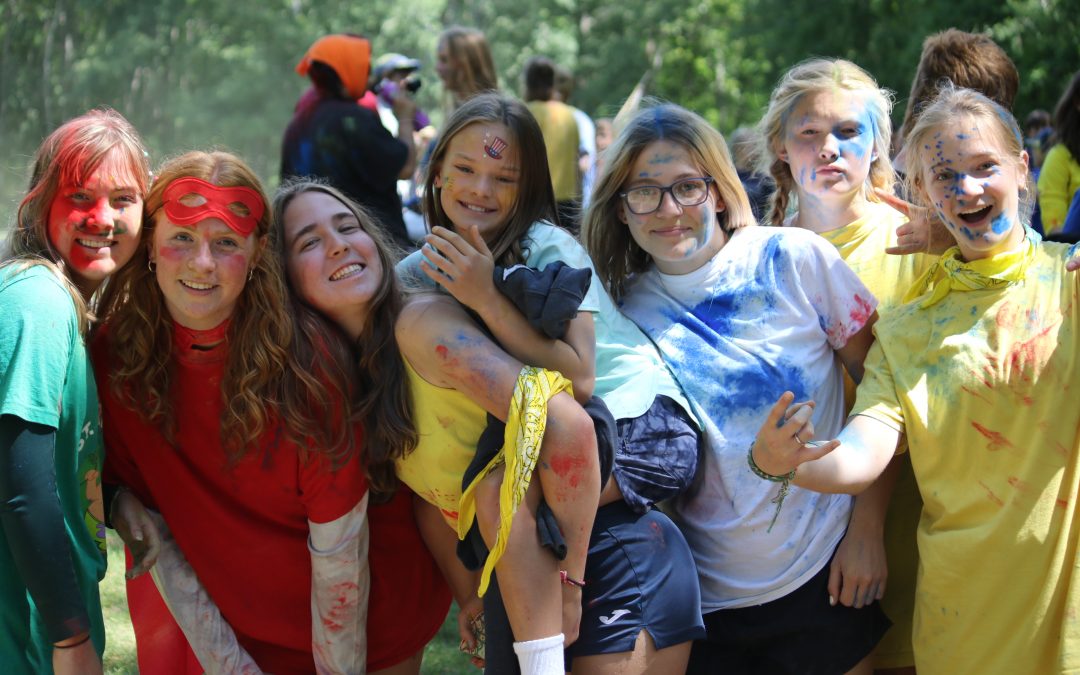Is your teen ready to dive into the summer camp experience? Deciphering this involves understanding their readiness for independence and eagerness for new ventures. Summer camps unlock doors to personal growth, social skills, and much more for your teenager. In this straightforward guide on “how to know if my teenager is ready for summer camp benefits of summer camps for teenagers,” we’ll help you pinpoint the signs that your teen is camp-ready and shed light on the tangible advantages these adventures offer—without the unnecessary fluff. Get ready for practical insights to prepare your teenager for a summer of growth and unforgettable memories.
Key Takeaways
-
Teenagers are ready for summer camp when they display keen interest in new experiences, comfort with staying away from home, and the capability to manage personal responsibilities.
-
Coed summer camps offer immense benefits for teen social development, including socializing with the opposite gender, exposure to diverse perspectives, and the development of empathy and comprehensive communication skills.
-
Attending summer camp fosters personal growth in teenagers by encouraging physical activity that boosts physical and mental health, nurturing independence through improved decision-making skills, and helping to form lasting friendships and improve social skills.
Determining Your Teen’s Readiness for Summer Camp
Summer camp can be a transformative experience for teenagers, where they can explore new activities, make lifelong friendships, and learn invaluable life skills. But how do you know if your teen is ready for this adventure? Let’s break it down into three key areas: their interest in new experiences, their comfort away from home, and their ability to demonstrate responsibility.
Interest in New Experiences
When it comes to assessing readiness for summer camp, a teen’s eagerness to try new things plays a pivotal role. Is your teen excited about the prospect of learning new skills, meeting new friends, and stepping out of their comfort zone? If your teen is proactive and excited about attending summer camp, it’s a strong sign of readiness.
After all, camp experiences are all about exploring new activities, such as horseback riding, making new friends, and even finding a new friend while stepping out of the familiar.
Comfort Away from Home
How comfortable is your teen with overnight stays away from home? If they have a positive record with sleepovers at friends’ or relatives’ homes, this can indicate a readiness for the separation from family that comes with summer camp.
The ability to adapt to being away from home is a crucial aspect of the camp experience and can set them up for a successful and enjoyable summer.
Demonstrating Responsibility
Finally, a teenager’s readiness for summer camp is tied to their sense of responsibility. Can they manage personal hygiene independently? Do they follow directions from adults? Taking on camp responsibilities such as punctuality and activity participation teaches teens to be accountable and reliable, vital traits for a successful camp experience.
The Advantages of Coed Summer Camps
After assessing your teen’s readiness, it’s time to delve into the benefits of coed summer camps, which offer a unique advantage. They provide:
-
A diverse environment that promotes social development
-
Exposure to a variety of perspectives
-
Help in making teens feel more comfortable and confident when interacting with the opposite sex.
Social Development
Co ed camp experiences at co ed camps are a catalyst for social growth, offering a unique alternative to single gender camps. By encouraging interaction between boys and girls, these camps foster essential social skills among campers. Activities are designed to help campers from both genders find common ground, leading to improved dependability, trustworthiness, and cooperation.
Diverse Perspectives
By bringing together teenagers from various backgrounds, coed summer camps provide a platform for teens to:
-
Gain an appreciation for different perspectives and cultures
-
Develop an understanding of diversity
-
Challenge and reframe their outlook on gender roles
-
Develop a more egalitarian approach
This inclusive environment offers a unique opportunity for personal growth and learning in a safe space.
Increased Comfort with the Opposite Gender
A key advantage of coed summer camp is the increased comfort level they foster among teens in interacting with the opposite gender. Continuous interaction in a non-threatening environment helps teens build confidence and feel at ease with the opposite sex, which is an essential skill for their future social and professional interactions.
Personal Growth through New Skills and Activities
Beyond the social benefits, summer camp offers a golden opportunity for personal growth. Through a range of new activities, teenagers can develop new interests, build confidence, and learn to overcome challenges. These experiences often lead to enhanced focus, discipline, and independent decision-making.
Developing New Interests
Summer camps offer a wide spectrum of activities, many of which may be new to your teen. Some of these activities include:
-
Archery
-
Performing arts
-
Sports
-
Outdoor adventures
-
Arts and crafts
-
Leadership development
These activities allow teens to uncover hidden interests, express themselves creatively, and develop leadership skills. This exposure to a range of activities can help in the reduction of fear associated with failure, fostering a growth mindset.
Building Confidence
Confidence is like a muscle; the more you use it, the stronger it gets. As teenagers learn and become proficient at new skills, they experience a boost in self-confidence.
Facing and overcoming challenges at camp strengthens a teenager’s self-esteem and fosters a belief in their abilities.
Overcoming Challenges
Summer camps expose teenagers to unfamiliar tasks and challenges, promoting resilience and adaptability. Whether it’s reaching the top of a climbing tower or navigating a tricky team-building exercise, these experiences teach teens not to give up, fostering a developed sense of determination and patience.
Strengthening Friendships and Social Skills
Beyond personal growth, summer camp offers the following benefits for campers:
-
Strengthening friendships
-
Honing social skills
-
Forming lifelong bonds
-
Improving communication skills
-
Fostering empathy and understanding
The shared experiences at camp can contribute to these positive outcomes.
Forming Lifelong Bonds
The shared summer camp experience during the summer months, from late-night conversations to campfire songs, forge new friendships. These unique and exciting moments form the foundation of long-lasting bonds, strengthening the friendships over time.
The camp environment nurtures creativity and encourages teens to engage in new endeavors comfortably, leading to improved emotional well-being and profound friendships.
Improving Communication Skills
Effective communication is a cornerstone of successful relationships, and coed summer camps provide a fantastic platform for developing this skill. Through team-based challenges and face-to-face interactions, campers learn the value of teamwork, cooperation, and mutual respect, all of which are fundamental to effective communication.
Developing Empathy and Understanding
Summer camps bring together a diverse mix of campers from varied regions, cultures, and backgrounds. This diversity cultivates a community that promotes empathetic and inclusive friendships. Through role-playing games and open conversations, campers grasp the repercussions of their behavior on others and develop a deeper capacity to understand different perspectives.
Building Independence and Decision-Making Abilities
Summer camp is more than just fun and games, it’s also a stepping stone towards independence and honing decision-making abilities. Through time management, problem-solving, and taking responsibility for their actions, campers learn to navigate life more effectively.
Time Management
Time management is a crucial life skill, and camp life offers a practical learning ground for it. Balancing fun activities and responsibilities, teens learn to prioritize tasks and organize their time effectively during the school year. These skills can improve self-perception and open doors for new opportunities.
Problem Solving
Problem-solving is another vital skill that teens can develop at summer camp. Activities that promote critical thinking and creative problem-solving are essential for enabling teens to tackle complex situations and overcome hurdles.
Taking Responsibility for Actions
Summer camps promote a sense of responsibility among campers. Teens learn to understand the consequences of their actions and make amends on their own terms, fostering trust and facilitating emotional maturity. This sense of accountability nurtures responsibility and emotional growth among campers.
The Impact of Summer Camp on Physical and Mental Health
A lesser-known benefit of summer camp is its positive impact on physical and mental health. From encouraging physical activity to reducing stress and anxiety, and enhancing emotional well-being, the camp environment serves as a catalyst for healthier living.
Encouraging Physical Activity
Physical activities at camp promote the creation of healthy lifestyle routines and can reduce stress levels. Engaging in physical activities at camp has been observed to enhance the overall mood of campers and help combat depression, anxiety, and other mental health conditions.
Reducing Stress and Anxiety
The natural environment of summer camps can significantly reduce stress levels and promote relaxation. Time spent in nature is linked to lower stress levels and improved mood, contributing to the overall mental health benefits of the camp experience.
Enhancing Emotional Well-Being
Completing challenging activities at summer camp can have several benefits for teenagers, including:
-
Instilling a sense of achievement
-
Developing emotional resilience
-
Enhancing overall emotional well-being
-
Fostering a feeling of inclusivity and belonging through camp rituals and traditions
These experiences can have a lasting impact on a teenager’s personal growth and development as kids learn, and many parents recognize the importance of such experiences.
Summary
In conclusion, summer camps offer an enriching experience for teens, fostering personal growth, strengthening friendships, enhancing communication skills, and promoting physical and mental health. Whether your teen is ready for this transformative summer adventure is a decision that you, as a parent, can make with the insights provided in this guide. Remember, every journey begins with a single step!
Frequently Asked Questions
What are the benefits of going to summer camp?
Summer camp offers numerous benefits, including the opportunity for children to explore individual interests, build lasting friendships, engage in physical activity, and gain confidence through new experiences and teamwork. Embrace these benefits for a well-rounded and fulfilling summer experience.
What are the disadvantages of summer camps?
Summer camps can be expensive and may increase pressure on kids to perform and compete. Additionally, absence from home can result in anxiety for some children and there is a risk of injury or illness. Lack of accommodations may also be a concern for children with special needs. Overall, it’s important to consider these factors when deciding on a summer camp for your child.
Why do parents send their child to summer camp?
Parents send their children to summer camp to provide them with a unique and beneficial experience, helping them gain new life skills, memories, and self-confidence.
Are summer camps good for children?
Yes, summer camps are beneficial for children as they provide a sense of community and teach the value of teamwork and making a positive impact. So, they are a great opportunity for children to grow and learn while having fun.
What does co ed mean in camp?
In a co-ed camp, boys and girls have separate sides of camp for bunks, but also participate in activities together during the day and meals. Evening activities are usually split between all camp activities and gender-specific ones.


